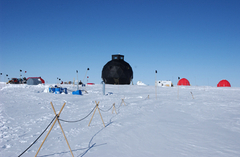 Not long ago the catastrophe-obsessed scientists of the Potsdam Institute for Climate Impact Research claimed that another 1.6°C of warming may be enough to melt all of Greenland’s ice and cause global sea levels to rise catastrophically.
Not long ago the catastrophe-obsessed scientists of the Potsdam Institute for Climate Impact Research claimed that another 1.6°C of warming may be enough to melt all of Greenland’s ice and cause global sea levels to rise catastrophically.
Keep in mind that the PIK is probably the biggest producer of catastrophe stories in the world after Hollywood.
Prof. Fritz Vahrenholt and Dr. Sebastian Lüning now say this fringe scenario has been handily refuted, citing a new, recently published international study authored by scientists of the Alfred Wegener Institute and others. They write:
Good news coming out of Greenland. A new study involving the Alfred Wegener Institute (AWI) of Bremerhaven has refuted earlier horror scenarios of the Potsdam Institute for Climate Impact Research (PIK), which claimed that a warming of 1.6°C possibly could lead to a complete meltdown of Greenland’s ice mass.”
The AWI study contains a surprising conclusion, say Vahrenholt and Lüning, who write at their Die kalte Sonne blog:
The surprising conclusion of the study, which appeared in the journal Nature: At air temperatures that were as much as 8°C higher than those of the 21st century, the ice mass melted far less then when compared to what was recently suspected. Back then the Greenland ice sheet played a far smaller role in the global sea level rise during the Eem interglacial than what was previously assumed. Should the current temperature rise in Greenland continue, then the reactions of the ice sheet in the wake of the Eem warm period apply as possible future scenarios for the ice mass on the island.”
Such is the difference between fishy models and reality. Lüning and Vahrenholt therefore now see a considerably diminished danger of an Greenland ice meltdown. Greenland was far from being ice-free during the Eem interglacial of 130,000 to 115,000 years ago. Lüning and Vahrenholt add:
To the contrary: From the peak in the glacial period prior to the Eem, about 400 meters were lost in size, and it was 130 meters lower during the Eem 130.000 to 115.000 years ago than it is today. In the same time period it’s volume shrank a maximum of one quarter.”
Vahrenholt and Lüning conclude:
The good news of the study was that the Greenland ice sheet did not react as sensitively to this temperature rise as previously thought.”
Photo credit: Alfred Wegener Institute.





There is an article from 2010 in German http://www.scinexx.de/wissen-aktuell-12041-2010-08-02.html
“After five years, the NEEM deep ice core drilling has now penetrated the Greenland ice sheet and at a depth of nearly 2,540 meters, reaching the bedrock.”
115.000 years ago the ice did not exist! It was warmer than today without SUV’s.
I just wonder how much energy is required to melt a pile of ice that is 2,540 meter thick?
These guys will never be able to get a liplock on the R&D funding teat if they don’t make hysterical claims, fear Mongering and radicalize science.
The Potsdam crew could teach them a few lessons.
What I really enjoy about alarmists is that, in large part, they are about as humorless and self-absorbed as a recovering drug addict.
What makes you think they are recovering? They haven’t even started to take the new paradigm medicine.
[…] https://notrickszone.com/2013/02/18/german-scientists-vahrenholt-and-luning-pik-greenland-meltdown-sc… […]
[…] NO TRICKS ZONE German Scientists Vahrenholt and Lüning: PIK Greenland Meltdown Scenario Handily Refuted By P Gosselin on 18. Februar 2013 https://notrickszone.com/2013/02/18/german-scientists-vahrenholt-and-luning-pik-greenland-meltdown-sc… […]